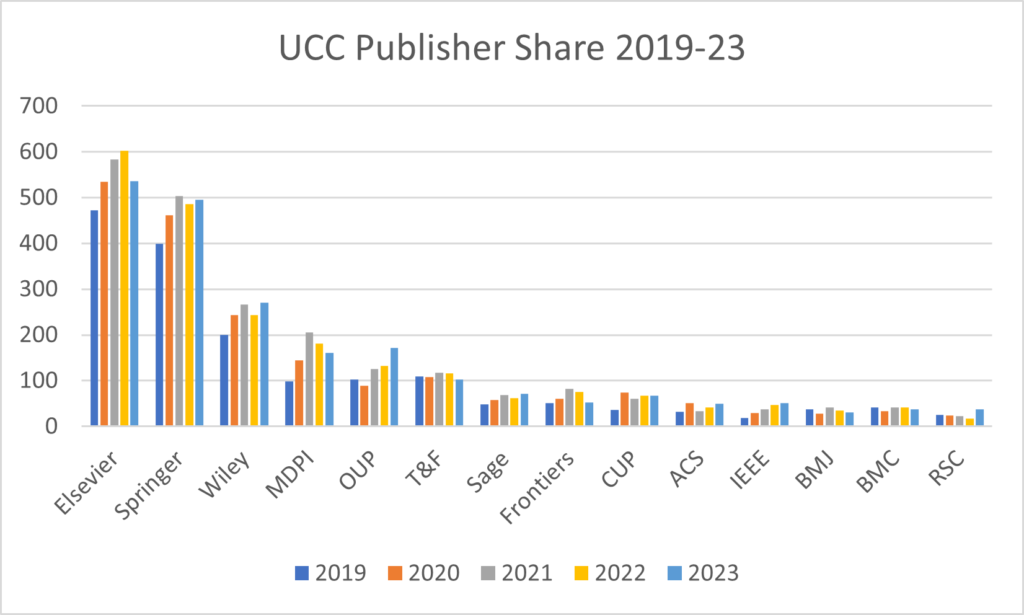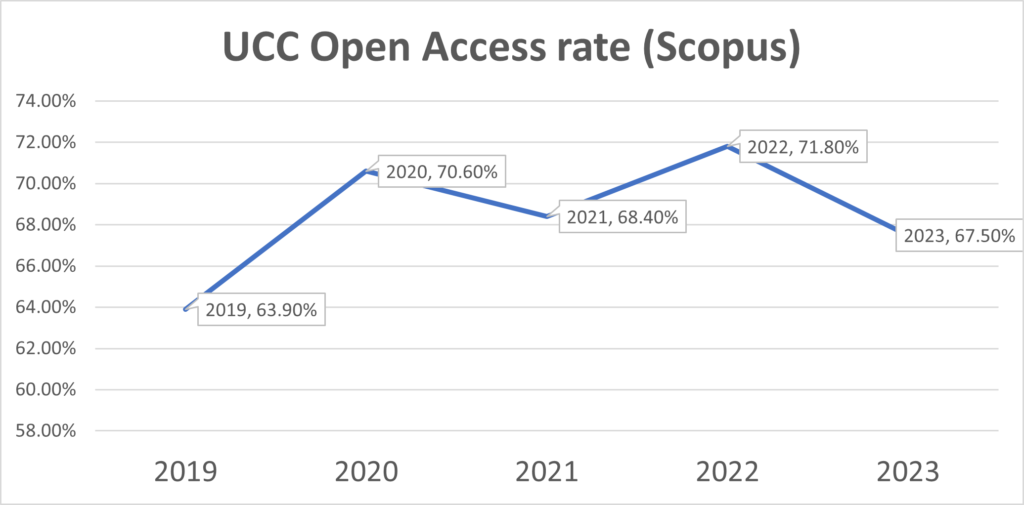Written by Hardy Schwamm, Head of Research Services, UCC Library
This blog post will look at some basic scholarly communications facts and figures of of academic short form publications authored by UCC (journal articles, conference papers, book chapters). We then trying to establish where we are with our efforts of publishing Open Access so that UCC research is accessible globally.
How do we know how much we publish as a university?
Determining the volume of publications produced by University College Cork (UCC) is more challenging than it initially appears. While there are several data sources available, each comes with its own set of limitations and complexities. Currently, we rely on databases such as Scopus and OpenAlex to track our publication output. These platforms provide extensive bibliometric data, but they may not capture every publication, especially those in niche or emerging fields. Additionally, the National Open Access Monitor, funded by the National Open Research Forum (NORF), is still in its pilot stage and thus was not utilised in our analysis.
Looking ahead, the implementation of a new Current Research Information System (CRIS) could significantly enhance our ability to monitor and report on UCC’s publication activities. A CRIS would offer a more integrated and comprehensive approach, potentially consolidating data from various sources and providing real-time insights into our research output. This would not only streamline the process but also improve the accuracy and completeness of our publication records, making it a valuable tool for future reports.
How much did UCC authors publish 2013-2023?
Over the past decade, University College Cork has demonstrated a consistent upward trend in scholarly communications output. Looking at figures from OpenAlex, UCC started with 1,935 publications in 2013, the numbers gradually increased, surpassing 2,000 publications by 2015. A notable surge occurred between 2019 and 2020, with publications rising from 2,466 to 2,864. The peak was reached in 2021 with 3,399 publications. Although there was a slight dip in 2022 to 3147, the output rebounded to 3,294 in 2023, indicating sustained growth and resilience in research productivity at UCC.

Who do UCC authors publish with?
We analysed OpenAlex data to see who the popular publishers of UCC authors are. From 2019 to 2023, University College Cork (UCC) authors predominantly published with Elsevier, which accounted for 18.0% of the total publications (2730 out of 15130). Springer Nature followed with 15.5% (2346 publications), and Wiley was third with 8.1% (1223 publications). MDPI and Oxford University Press also had notable shares at 5.2% and 4.1%, respectively.
Other publishers like Taylor & Francis, Sage, Frontiers, and Cambridge University Press had smaller but consistent contributions, each ranging between 2.0% and 3.7%. The data indicates a diverse range of publishers being utilized, with a significant concentration in the top three. It is worth noting that a considerable proportion of UCC publications are with fully Open Access publishers such as MDPI and Frontiers whose practices some see as controversial.

How much of what we publish is available Open Access?
Both Scopus and OpenAlex offer statistics on Open Access publications. Over the past five years, these figures have varied, but our most accurate current rate of Open Access publishing stands at 68%. This means that two-thirds of all publications with at least one UCC-affiliated author are freely available online under an open license. Conversely, 32% of our publications remain restricted, typically behind a paywall.

What is our UCC ambition on Open Access?
There are two drivers for our Open Access ambitions:
- The first is our institutional strategy “Securing Our Future” 2023-28. The UCC Strategic Plan states in Goal One: Research and Innovation: “We will focus on increasing overall scholarly output across all publication types by 10% per annum and where more than 65% of all publications are open access by 2028. Given the data we examined above we can assume that we will reach that goal.
- The second is the National Action Plan for Open Research which was published in 2022. It includes the theme “Achieving 100% open access to research publications”.
Clearly, the target included in our institutional strategy of a 65% Open Access rate is achievable, in fact we have moved beyond that already. However, the national target of 100% Open Access by 2030 seems to be very ambitious.
How do we get close to 100% Open Access?
Some might argue that 100% Open Access is simply impossible, and we shouldn’t even attempt to achieve that goal. However, we see that the institutions with the highest Open Access rates in Europe are (according to the Leiden Ranking) currently in the Netherlands and the UK with figures in the high 80s but some like the University of Groningen (98.1% Open Access rate!), Twente (94.3%) and University of Dundee (93.1%) are pretty close! This proves it is possible to get close to the target of 100% Open Access!
What does UCC need to do?
First, it would be great to learn from those universities that do well on Open Access and see how we can translate that into the Irish context. But more generally it seems that the following will help our Open Access publishing to thrive
Continue with and improve IReL Open Access agreements
The so-called Transformative Agreements are not without criticism: there are questions around costs, equity, administrative burden, transparency and market concentration. However, at UCC the IReL agreements support Open Access of more than 500 publications per annum, about 20% of all of UCC’s output. This is significant, and many authors benefit from these agreements who otherwise would not be able to publish (Gold) Open Access. In our view, these agreements are not ideal but going back to a subscription model seems counterproductive and backward looking. Open Access agreements are here to stay (at least for the foreseeable future) but they need to be improved to mitigate the justified criticisms.
Introduce Rights Retention policy
Rights Retention is a policy that allows researchers to retain certain rights to their work, rather than transferring all rights to publishers. This means that authors can make their Author Accepted Manuscripts (AAMs) available in institutional repositories or other platforms immediately upon publication, often under a Creative Commons license. Implementing a Rights Retention policy at UCC would significantly improve our Open Access rate by ensuring that all research outputs can be made freely available immediately upon publication.
The National Open Research Forum (NORF) is currently funding the project SCOIR that investigates Rights Retention in the Irish context, and we hope that some of the policy work SCOIR is looking at, can be adapted for our own Open Access Policy refresh.
Make Green Open Access the default for our authors
To further our commitment to Open Access, we propose making Green Open Access the default for all UCC authors. Green Open Access involves depositing a version of the manuscript, often the Author Accepted Manuscript (AAM), in our institutional repository CORA. This approach ensures that research outputs are freely accessible to the public, even if they are published in subscription-based journals. By strengthening our existing Open Access policy including Rights Retention, we can significantly increase the visibility and impact of our research, align with global Open Access standards and funder requirements, and support the broader dissemination of knowledge. We need to make “Archive on Acceptance” the norm at UCC and lead by example in the academic community.
Conclusions
University College Cork (UCC) has demonstrated a notable increase in publication volume in the last 10 years, aligning with trends observed at other research-intensive universities. The choice of publishers, such as Elsevier, Springer Nature, and Wiley, mirrors those favoured by similar institutions, indicating that UCC is on par with its peers in terms of scholarly output and publisher preferences.
A key strategic objective for UCC is to significantly increase its Open Access rate. This ambition is part of the University’s broader institutional strategy and aligns with national goals for Open Research. To achieve this, UCC Library aims to support a diverse Open Access landscape, recognising the importance of bibliodiversity and various publishing models. The introduction of a Rights Retention policy will be a crucial tool in this effort, ensuring that more research outputs are freely accessible. By adopting such measures, UCC is committed to enhancing the visibility and impact of its research, fostering a culture of openness and collaboration.

